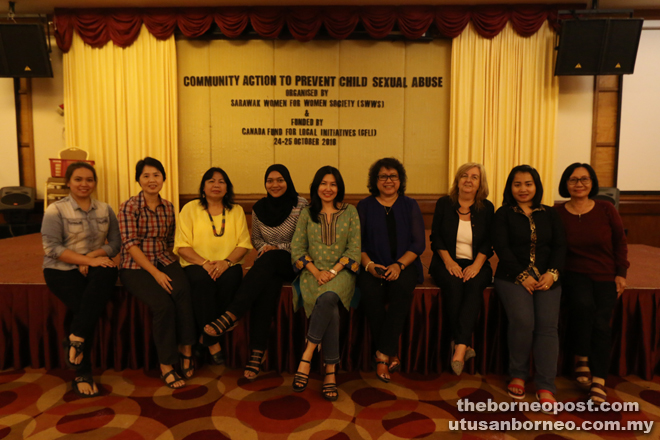
(From fourth left) Training and education executive of PS The Children, Farah Ilyia Fauzi; Yong, SWWS president Margaret Bedus, Raja and others after the workshop.
SIBU: There is a need for better coordination, system and awareness among parents in protecting their children from becoming easy prey of cyber or online groomers.
‘Grooming’ is a word used to describe people befriending children with the intention to take advantage of them for sexual purposes.
According to the founder and board member of Protect and Save The Children (PS The Children) Madeleine Yong, although there was no exact figure, on average, police are picking up cases involving teenagers as young as 13 years old. The issue affects both boys and girls.
She said pedophiles could be anyone such as school teachers, camp leaders and so forth who target children offline and online.
In offline cases, to get access to children, they befriend the children’s families, groom the children through touch and then sexually abuse them.
“Sex abusers can gain access to children very easily, disguised as friends. Furthermore, making friends online is a lot faster as they don’t have to see each other face-to-face so can hide their identities and ages.
“They get a lot of information about the children – some of them teenagers. After a while, they meet and establish relationships and that is when the abuse start. Basically, it’s now online access and offline abuse,” she said.
She was speaking to The Borneo Post on Tuesday afternoon after a two-day Community Action To Prevent Child Sexual Abuse Workshop at Kingwood Hotel from Oct 21. It was attended by nearly 100 people.
The workshop was jointly organised by PS The Children and Sarawak Women For Women Society (SWWS) and fully funded by Canada Fund for Local Initiatives (CFLI).
There is no exact figure or data on the abuse cases, but offline grooming alone affects one in four children, which is scary.
For online, there were 47 reported cases from WeChat alone as of September 2016 in Malaysia.
Other social media sites the sex abusers use to groom children are Instagram, Facebook and online games such as Clash of Clan and War Craft.
She said all interactive games allow sex offenders to privately message the children and interact with them.
Though most people thought it harmless, it was something most people, especially parents, should watch out for.
“We are not asking children not to go online because you can get a lot of information online, but they need to know the boundaries. For example, they should not give all their personal information to people they do not know,” she said.
When the conversation became explicit and sexual such as a request to take naked pictures, the children would be threatened by the perpetrators.
Yong said all of that could be prevented if parents update themselves on the issue.
They should watch out if their children suddenly receive many gifts and became obsessively secretive, such as refusing to tell who they were meeting or not willing to reveal the photo galleries in their handphones.
“If you as parents are ignorant, you do not realise the real problem. There are many people who are unaware of online grooming.
“Children are exposed to the internet and pornography yet we think sex education is not necessary. Adults need to catch up with technologies and educate themselves and their children on how to keep safe,” she pointed out.
She lamented that enforcement in Malaysia was not ready to tackle the issues with no expertise or equipment available.
“In Richard Huckle’s case, the police in Britain are trained to do online forensic investigation; they tracked Huckle purely using forensic evidence without the need for the children to testify,” she said.
Yong, who had been involved in the organisation for about 20 years, said the organisation had studied thousands of cases.
She said paedophiles fell into the category called paraphilia, a sexual disorder where they get aroused by children.
Some pedophiles were married and had difficulty interacting with adults, though easily with children.
“It’s not a myth. It’s not about men doing this because their wives are not available. They are actually attracted to children… we have done thousands of cases on this,” she said.
She said another weakness in this country was the unavailability of rehabilitation programmes for sex offenders and no standardised reporting process.
So far, the conviction rate for sex offenders was only three per cent.
“We have done this work for about 20 years, Huckle’s case is just another wakeup call for this nation, we really need to look into prevention,” she pointed out.
SWWS Exco member and workshop designer Gill Raja said child protection was a responsibility of the government department and the community.
She said Malaysia amended the Children’s Act but there is a need to put resources together and improve the system.
“We’ve got the foundation stone in place; the foundation of the jig-saw is in place, we just need a lot more coordination and awareness, and be more systematic,” she said.
The two-day workshop aimed to create better awareness in society and have a ripple effect for them to put services together to help the children.
“We cannot change everything after just two days’ training. We’ve got to take a step further by bringing together the main stakeholders to figure how we can make systematic change for better action,” she said.
She said through the funding from CFLI, SWWS was able to conduct the first stage training and help a few groups take the message back to the community.
There was a good turnout from members of the public in Sibu including teachers, government agencies, religious groups and non-government agencies.
A similar workshop held in Kuching on Oct 21-22 was attended by about 100 participants.
